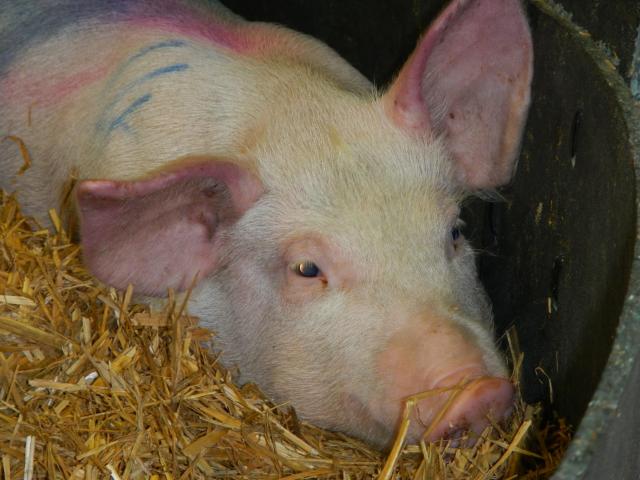Some feeds can make pigs sick and bring diseases into Australia
Feeding pigs with any products that contain or have had contact with meat is illegal because the meat can contain viruses that can cause diseases in pigs, as well as spreading diseases to other livestock via pigs. These diseases include foot-and-mouth disease, Aujeszky’s disease and African swine fever.
Some small-scale pig owners or owners of pet pigs may not be aware that feeding kitchen scraps or catering/deli/grocery waste to pigs is illegal unless it is free of any meat products and has not had any contact with meat.
See the DPIRD pig feed webpage for more information about what pigs should eat.
Exotic disease alert - African swine fever
WA pig owners reminded to be on guard for African swine fever (ASF) – spreading in China and Europe

Western Australian pig producers are reminded to be vigilant about biosecurity measures on their properties as African swine fever (ASF) continues to spread in China and Europe.
ASF is a highly contagious viral disease of pigs that is not present in Australia. It does not affect human health and pig meat is safe to eat.
Current situation
ASF has historically been widespread in sub-Saharan Africa, and spread to Eastern Europe and Russia within the last 10–12 years. On 3 August 2018, the world’s largest pig producer, China, reported its first outbreak of ASF, and as of 5 October, 34 farms/abattoirs across eight provinces had been affected. In September 2018, ASF was also detected in Western Europe (Belgium) for the first time.
There has never been a case of ASF in Australia. These international events highlight the real risk posed by ASF and the importance of early detection of emergency animal diseases. Continual and strong biosecurity practices are vital to prevent the introduction and spread of disease.
Signs of ASF
ASF can affect pigs of all ages.
Disease signs include high fever, ‘blotching’ of the skin, lack of coordination, reluctance to stand, diarrhoea, red or blue-coloured skin (particularly around the ears and snout), coughing and difficulty breathing. Death rates are often very high.
There are no treatments or vaccines available.
Recommended biosecurity for pig owners
Pigs usually become infected with ASF through direct contact with infected pigs, by contact with contaminated vehicles, equipment or clothing or by eating infected pig meat or pig products.
Producers can take steps to reduce the risk of ASF entering their property if it were to reach Australia. It is recommended that producers:
- Ensure workers who have travelled to countries where ASF has been reported do not enter the pig farm for 7 days, and ensure they are in clean clothes and boots.
- Limit visitors to pig farms.
- Ask visitors to confirm in the visitor’s log that they have:
- showered and changed clothes and boots since their last contact with pigs
- not returned from countries where ASF has been reported in the last 7 days.
- Provide clean clothes and boots for visitors.
- Ensure all feed suppliers and workers are aware that it is illegal to feed meat, meat products or products that have had contact with meat to pigs.
- See the DPIRD pig feed webpage for more information on prohibited pig feed (swill feeding).
- Read more about pig biosecurity on the Farm Biosecurity website.
You can protect WA’s pigs – report any signs of ASF or illegal feeding of pigs
ASF is a reportable disease and early intervention is vital to prevent its spread. If you suspect ASF, you must report it immediately to the Department via your local DPIRD field vet or through the Emergency Disease Watch Hotline on 1800 675 888.
If you suspect that a business is supplying feed for pigs that may contain meat or have had contact with meat, or that a producer is feeding these products, contact your DPIRD field vet.
For more information about ASF, see the DPIRD webpage and the federal Department of Agriculture and Water Resource’s webpage.
WA Livestock Disease Outlook highlights benefits of surveillance
Australia’s ability to sell livestock and livestock products depends on evidence from our surveillance systems that we are free of livestock diseases that are reportable or affect trade. The WA livestock disease outlook – for producers summarises recent significant disease investigations by Department of Primary Industries and Regional Development vets and private vets. Data from these investigations provide evidence that WA is free from these diseases and supports our continuing access to markets.
We welcome feedback. To provide comments or to subscribe to the monthly email newsletter, WA livestock disease outlook, email waldo@agric.wa.gov.au.
